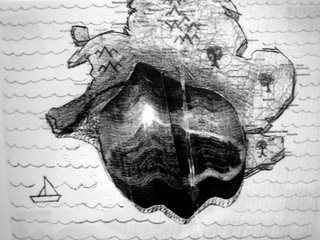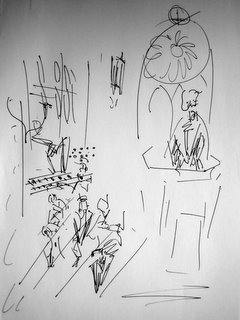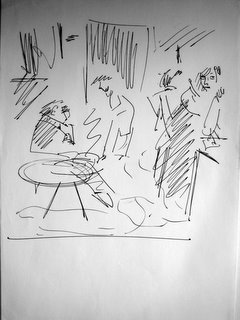Chapters V and VI
William Blackstock felt a shard of light burning his face. It came from a gap in the curtains and it shone an intense light across his cheek and the bridge of his nose and over his left eye. William squinted. It was Monday morning. He moved his hand over the other side of the bed. Kate was up. Must be past seven.
William was covered in a film of sweat and his face itched from not shaving. He pressed his tongue over the bridge of his mouth and round his furry brown gums. He tasted stale alcohol and food and tobacco. His throat felt harsh as though splinters lay in his windpipe, but he did not want to lubricate it by swallowing his evil tasting spit. His heart suddenly leaped. It often did this, especially after a night of drinking. It was the jolt that awoke him and told him he was alive and that the body in which his mind rested was indeed his own. He shut his eyes to go back to sleep but he felt too disgusting to be sufficiently at peace. A voice in his head said “I shall never drink again.” This is what he and his drinking friends often said to each other the morning after a heavy session. Another voice laughed. William smiled in his head though his mouth did not move. He heard the door open.
“William Blackstock, you might not like your job but you’ll like poverty even less.” There was a silence while Kate Blackstock looked at the lump which lay sprawled across their bed. The lump knew it was being watched, but did not move. “I don’t mind being a kept woman, even if you don’t keep me on very much. But – as God is my witness, William Blackstock – you do not want to make this wife into a pauper. You will not get a moment’s peace, so you won’t. You’ll be thirsting for that factory.” William had heard all this before. He quite enjoyed hearing it so long as he did not need to reply. “And she might decide not to cook for you anymore. Not that she ever has anything to cook with now.” It was all William’s fault. He knew. His fault that the family was poor. “And she might decide not to darn your socks or repair your trousers.” It was his fault that his clothes got damaged at the factory. “Or maybe she’ll decide not to come to church with you anymore. Maybe praying for her own sins will be enough!” Kate never drank or swore or slept with other men or coveted her neighbour’s ox. She was a good person. William, William always thought, was not a good person. He was not a bad person. But he only ever tried to abide by the eleventh commandment: don’t get caught. “And maybe she’ll sleep in a separate bed to you and never let you get your dirty hands all over her. Now get up, William, and go to work!” She dragged the blanket off him with a powerful pull. William made a groaning sound, turned his head to Kate and squinted at her. William was thirty-four but, aside from the toll which twenty years of hard labour had taken on him, he retained his laddish good looks. He still knew how to use the twinkle in his eye that he had first used on Kate when he was fourteen, when they first kissed outside the Baker’s Arms down in Lambeth.
“Kiss me,” he murmured, his voice cracking with his first words of the day.
“I don’t want to kiss you. You’ll have a mouth full of beer and tobacco.”
“Kiss my cheek then.”
“William, get up.”
“Kiss my cheek.”
“I’ll kiss your cheek when you’ve shaved. Your bristles are two days old. It’s be like kissing a steel brush.” Her tone softened. “Now get up, William. I’ve made you some porridge. It’s a bit watery but it’s not bad. The boys got us some honey last night.” Kate hated it that William got drunk on Sundays, but she hated it more that her husband had to work as a slave all day. She tried to be a good wife. She did not often complain, or she hoped she didn’t. She shouldn’t have threatened him like that. She would sleep with him whether they had money and food on the table or not. She would darn his socks as long as he had feet to wear them. The husband of a friend, an Italian called Marco, only had one pair of socks now, and he never took them off. His wife had tried to take them off a while back. He had been wearing them for months and the skin from the sole of his foot had peeled off with the sock, and he had yelled so much they had left the sock on. He hadn’t worked for several weeks now because he could no longer stand up. His leg would have to be chopped off. They had children too. What would they do? Terrible. It didn’t bear thinking about.
Kate pottered in the kitchen. The boys were outside, already on the make, trying to bribe the kids from down the road to sneak into the vegetable man’s shop and nick a couple of cabbages or a bag of potatoes. The kids from down the road agreed to anything. They were so poor that some people reckoned they sometimes ate clay to stop them from going hungry.
Kate listened to the bumps and muffled expletives of her sleepy, still drunk husband trying to navigate the bathroom. It was still bitterly cold out, but the sky was whiter than it had been the past few weeks. Clouds still filled the sky but they looked less threatening than before. In the middle distance was a patch of sky of such brilliance that Kate knew the sun must have been just behind, waiting for its chance to shine.
Kate sat on the chair by the kitchen table and folded a dirty dishcloth into her waistline. William would be late, which would mean he would get punished and possibly get some pay docked, but at least it meant that he was at home for half an hour more. She liked having time on her own, but she didn’t have anyone to talk to. The Blackstocks were the wealthiest family on the street and everyone knew it, which meant nobody spoke to them. Her boys stole, just like all boys, but her boys led the street’s juvenile crime ring, and they had more intellect than their subordinates to engineer a higher cut of the earnings. She and William were the only couple they knew who were happy together. Other couples had been happy at some point in the past. But now they were so poor that the basic instinct for survival had defeated any feelings of romantic love for one another. Kate didn’t mean to, but she looked down on some of the women. Almost none of them were pure, or faithful to their husbands, and especially not the girls. When Marco Pirelli had a gangrenous leg, the Pirelli family had to find an alternative source of income. As Kate had heard somebody say, morality on £5,000 a year in Belgrave Square is a very different thing to morality on slop-wages in Bethnal Green.
Kate had a fantasy that one day she would have a maid to make breakfast and get everybody up and washed and dressed and packed off to work or school, and Kate would simply sit and watch. She would be the calm in the eye of the morning storm. It was a flight of fancy, she knew, and she usually felt miserable once she returned to her senses. She would always be the housewife, William would always break his back in that factory, and the boys would always be scavenging. They would never have enough to be really happy, but always too much to have friends.
Still, this morning she could catch her breath while William got dressed. The porridge was still warm on the stove ready for him. William had smelt it in the bathroom and had made approving noises. The Christmas tree stood in the corner of the room on top of an upturned wicker basket three feet off the ground. Its needles had mostly turned brown and lost the life to cling to the branches. The tree was now a sad, spindly looking thing, like a cage of bones, but Kate could not bear to take it down. On Christmas Day it had been the tree that convinced the Blackstocks that they were the equal of kings and queens. Just for that one day they had good food, including a round, succulent goose; they had beer and wine and home-made lemonade for the boys, which they mixed with William’s ale when he fell asleep; and they all had presents to give each other. They had a tree with a star and they played games and sang songs and talked into the night. And William had told the children the real message of Christmas and of Jesus, and they had told him that they were like Jesus and he was Joseph and Kate was Mary, and they made up extra people for the wise men and the shepherds. On the twenty-sixth they had a little less food and the tree began to turn, and on the twenty-seventh the boys were scavenging again and William was back at work and now it was like Christmas had never happened, except for the tree.

After William had washed and dressed he came through and ate his porridge. He and Kate talked a little, she remembering something one of the boys had said and he smiling. But somehow their hearts weren’t in it. They had flirted with each other, but Kate had been thinking of Christmas and how it was another year away, and William had been thinking of about the punishment he would get for being late. Neither of them wanted to speak, not to anyone. They both just wanted to think, alone. William kissed Kate goodbye and walked out the front door.
As he walked down the street, he had the feeling he was being followed.
VI
The Bubble had, as Reverend Dalrymple predicted, arrived safely in London in the early hours of the morning, though by this time it was hardly a Bubble. It was more like something between a marble and a snowball. Its surface was still transparent and permeable and still indestructible, and it had swallowed up more and more people and buildings and animals and crops – everything and everybody, in fact, from Ottery St. Mary to Croydon. What had begun inside Joanna as the thing she foresaw would save the world had made a curious journey at an amplified pace. It had dawdled for several days in and around the church, yet had just travelled 140 miles in a single night. Its rate of growth was swift too. By the time it reached London it was many times – perhaps a thousand times or more – larger than it had been in Devon. It was as if the south and south-west of England had gradually rolled itself into a ball and rested just outside of London. At around midnight, somewhere near Salisbury and not far from Stonehenge, the dry frostbitten earth had started to crack, just as mud cracks under the weight of heavy boots. Soon the cracks became wider and started to join up with each other. The Bubble continued to tear through Wiltshire and Hampshire, but now the ground had surrendered its attempts at keeping this thing above ground. The Bubble was burrowing through topsoil right into the earth. It groped and rummaged in every direction. By two in the morning, houses in the Berkshire Downs had succumbed to the Bubble’s forces. By four it had reached Woodstock in the north, Windsor in the east, and in the south had eaten up the seaside towns of Worthing and Littlehampton and Shoreham by Sea, and was making gains into the English Channel. By six, the Bubble had absorbed the following counties:
BEDFORD (part)
BUCKINGHAMSHIRE
CARMATHEN (part)
CELIDIGION (part)
CORNWALL
DEVON
DORSET
EAST SUSSEX (part)
GLOUCESTERSHIRE
HAMPSHIRE
HEREFORDSHIRE
MONMOUTHSHIRE
OXFORDSHIRE
NORTHAMPTONSHIRE (part)
POWYS (part)
SOMERSET
SURREY (part)
WARWICKSHIRE
WEST BERKSHIRE
WEST SUSSEX (part)
WILTSHIRE
WORCESTERSHIRE
Its journey had been like that of a large and powerful steamer cruising through water, the driving force of its journey causing surges outwards, which in turn get forced back inwards. Eventually the direction of the water’s current returns to the centre. But water is fluid and earth is not, which meant that the shock waves of the Bubble’s direction of travel returned inwards and stuck to the ever-expanding mass of the Bubble. To get a rough sense of what England looked like on this morning, one should take a map of the British Isles and stick pins into the following towns:
BRIGHTON
EAST GRINSTEAD
BOREHAMWOOD
DUNSTABLE
DAVENTRY
REDDITCH
LUDLOW
KNIGHTON
TREGARON
CARMATHEN
REDRUTH
ST. HELIER
In doing so, you will create a perforated outline of a circle. If you imagine this circle bulging out of the map, as well as burrowing into it, this was England and Wales.
But at daybreak the following morning, the Bubble stopped with a start in Croydon in south London. Once again, it was like travelling on a train, and the Bubble’s passengers had barely noticed they had been on the move all night until this sudden halt. It did not seem to anyone that the Bubble had (to coin a phrase) ran out of steam. There was clearly some reason why it had decided to stop in Croydon, besides the fact that the sky had become lighter and it was clearly time for breakfast. As they had been settling themselves in to their new world, nobody had paused to think who might be in control of the Bubble, or who was in charge. As far as anybody was aware, the Bubble existed in an organic state. No decisions had been made regarding political structures such as governments or committees or boards, or at least if there had, such decisions had not been made public.
But Croydon represented an important, even historical, point in the short time of the Bubble’s existence. The weight of the Bubble – such as it was filled with several hundreds of thousands of people, from the poorest farm tenant to the richest proprietor, with their homes and furniture, and the fields and roads and woods and rivers of their erstwhile towns and villages – was too much to allow it to continue burrowing and churning and eating up the earth. Having consumed much of the English Channel, there was also a need to reconfigure its structure so that its million or so inhabitants did not drown in its million or so gallons of water. Anyhow, whatever its composition, everybody in the Bubble said that the Bubble would get the world it deserved.
And so, in a very short period of time and in a manner which nobody noticed, all its water molecules were redistributed to the Bubble’s surface; all the atoms which made up its earth and trees repositioned themselves along invisible strata which ran from east to west and north to south (although east and west and north and south no longer existed); and people drifted from earth to water, or from friend to relative, just as they pleased. Although it soon turned into something quite different, the Bubble began as a fantastical world. High in the sky, brownish yellowish clouds tinted with silver loomed, drawing the eye back to the cold black mystery of the old world where only a few unfortunates remained. Birds, bats and giant bugs patrolled the skies, dancing on cloudpeel or colliding groundwards.
At ground-level, all aspects of the English countryside were piled on top of one another without rhyme or reason. The fields of Salisbury Plains rolled on the horizon, with the deep forests of Nottingham echoing damply below. As the eye followed birds floating from treetop to treetop, its journey would become interrupted by Dover’s chalky cliffs and Somerset’s apple orchards and fruit-pickers, kissing couples, small boys playing hide-and-seek. The busyness of the scene soothed the eye and the pensive spectator might well find himself looking heavenwards in search of a creator to thank: and there he would have seen, in the very ceiling of the sky, a large egg-shaped pod, pearly in colour, where Reverend Dalrymple sat looking on benignly. During that first dawn, when everybody and everything was trying to find its station in a new and uncertain world, it rained for four solid hours and no one was sure whether it would cause flowers or floods.
Upon reaching Croydon the Bubble developed feelers, and these feelers were covered in mouths. The mouths had a double function: to suck up and gorge on any creature or object which they felt would be to the Bubble’s advantage, and to spit out a sweaty saliva which they aimed at creatures, mostly people or dogs, who incurred their displeasure, and which turned them to liquid. By mid-morning they had eaten several thousand Londoners. By lunchtime the streets of every outer London borough from Greenwich to Harrow, from Kensington to Waltham Forest, were running with liquid flesh and blood.
CHAPTER VII OUT ON 8 AUGUST 2006.




